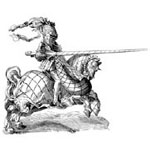
The Catholic Connection
DISPATCH FROM THE FRONT
A war is being waged for the soul of America, and Catholics are on the front line. In a recent homily, United Methodist Bishop Timothy Whitaker, quoting Pope John Paul II’s encyclical Evangelium Vitae, decried Methodist passivity on abortion. “I would like to be bishop of a church,” he said, “that knows how to make philosophers and politicians feel the same revulsion [as I feel] of the moral horror of abortion.” Evangelical leaders have sided with Catholic candidates for the Republican presidential nomination, and in denouncing the Obama administration’s attack on religious liberty, former Arkansas Governor Mike Huckabee, an ordained Southern Baptist minister, drew cheers for a fiery five-word declaration: “Now we are all Catholics.”
That Huckabee was willing to go this far, given the fact that anti-Catholicism has been aptly described by John Higham, professor of history at the University of Michigan, as “the most luxuriant and tenacious form of paranoiac agitation” in U.S. history, says something about Rome’s steady witness to truth. But before focusing on the Church’s singularity, it should be said that Huckabee’s battle cry takes on additional meaning when set against the backdrop of history. Over the years, a good many Protestants, some of them well known, have stood up for a beleaguered Catholic minority, though the mode of expression has been subtle and oblique compared to what we are hearing today.
Henry Wadsworth Longfellow, chairman of Harvard’s modern language department during the 1840s, introduced the practice of engaging native-born speakers to teach foreign languages, thus opening the door to the hiring of French, Spanish, and Italian Catholics. He was also the first American to translate Dante’s Divine Comedy and the poetry of Michelangelo into English, along with the work of St. Teresa of Ávila, including her much-loved prayer that begins with the words, “Let nothing disturb thee.” Evangeline, Longfellow’s greatest poem, sings the praises of a French Canadian driven from Acadia by Protestant ethnic cleansers, and in one of its more memorable passages, the heroine, who eventually becomes a Little Sister of the Poor, is described as shining with “celestial brightness” and “ethereal beauty” after receiving the Sacrament of Penance.
Robert Louis Stevenson is another case in point. The author of Dr. Jekyll and Mr. Hyde took up the cudgels for Fr. Damien de Veuster, the “leper priest,” when Damien came under fire from a narrow-gauged Congregational minister. “I have seen sights that cannot be told and heard stories that cannot be repeated,” Stevenson wrote in 1890 after visiting Damien’s colony, “yet I never admired my poor race so much nor (strange as it may seem) loved life more than in the [Catholic] settlement [of Molokai].”
You May Also Enjoy
In his final days the president requested the ministrations of Fr. Edward Vattmann, and upon his death he was buried with a final blessing by the priest.
The game diminishes the intrinsic worth of its participants, whose bodies, brains, and even lives are considered expendable.
Hawthorne, Thoreau, Melville, and Dickinson together comprise a reliable foundation for realist biases that are fully in line with the Platonic-Augustinian tradition.

